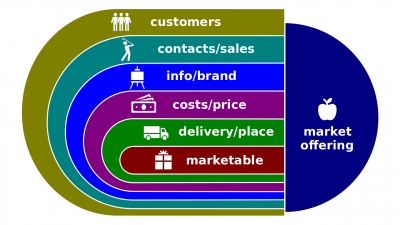Difference between revisions of "Service"
(→Definitions) |
|||
| Line 1: | Line 1: | ||
| − | [[File:Product.png|400px|thumb|right|[[Marketing mix]]]][[Service]] is | + | [[File:Product.png|400px|thumb|right|[[Marketing mix]]]][[Service]] is any [[marketable]] which exchange doesn't assume changes in ownership. Normally, ''service'' assume one, two, or all of three forms: (a) access to resources, (b) work carried out for or on behalf of others, (c) communications. |
| + | |||
| + | [[Service offering]]s may include some tangible goods such as manuals or food. The concept of [[value co-creation]] is central for those ''services'' that involve significant [[input]]s from the [[customer]]s and other [[stakeholder]]s. | ||
Revision as of 22:02, 3 May 2023
Service is any marketable which exchange doesn't assume changes in ownership. Normally, service assume one, two, or all of three forms: (a) access to resources, (b) work carried out for or on behalf of others, (c) communications.
Service offerings may include some tangible goods such as manuals or food. The concept of value co-creation is central for those services that involve significant inputs from the customers and other stakeholders.
Definitions
According to Marketing Management by Keller and Kotler (15th edition),
- Service. Any act or performance that one party can offer to another that is essentially intangible and does not result in the ownership of anything.
According to Managing Quality by Foster (6th edition),
- Service. A mix of intangibles and tangibles that are delivered to the customer.
According to the BABOK Guide (3rd edition),
- Service (business analysis). The performance of any duties or work for a stakeholder, from the perspective of the stakeholder.
According to the ITIL Foundation 4e by Axelos,
- Service. A means of enabling value co-creation by facilitating outcomes that customers want to achieve, without the customer having to manage specific costs and risks.
